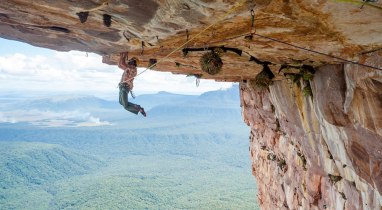Over the years, rock climbing has taught numerous lessons that can be applied elsewhere in life: How to push your limits, overcome fear and go well beyond your comfort zone; how to persevere and push through even the toughest obstacle (crux); how to lead a group and manage risk; how having a strategy is always beneficial and to not be afraid
Just like in climbing, anxiety and stress can pump you out and force you to fade out in the boardroom or during your presentation.
Don’t let go
Have a plan
Know when to rest
Don’t’ be Afraid
Learn This: The Over-Gripping Myth
As you move ever higher above your last piece and further outside your comfort zone, you grip the rock for dear life, even though you know the route is well within your ability. Yet here you are, only halfway up and too pumped to continue—everything feels way harder than it should. Most climbers have experienced this unfortunate situation: When you get scared, you hold on too tight and waste precious energy. The perceived solution: Focus on relaxing your hands to stop over-gripping the rock, thus lasting longer. While this does seem to make logical sense, over-gripping is actually not a significant factor in this perceived fatigue. Studies in applied physiology, neuroscience, and sports medicine point to stress itself as the culprit for accelerated fatigue. Anxiety can trigger the release of a certain hormone that can make you feel more pumped and tired than you actually are. Here we’ve provided some tips and tricks to conquer your fears and prevent the dreaded pump.
Physiology of Anxiety
When we attribute poor performance to over-gripping, the situation is usually the same: We’re uncomfortable and experiencing a stress response. When we get stressed, whether out of fear, competition, anxiety, or any other worry-inducing factor, we experience a few common physiological changes. Our heart rate increases along with breathing. We switch energy systems from the slow-burning aerobic system, which runs primarily off stored fat, to the faster anaerobic system, which runs primarily off carbohydrates. Our core body temperature starts to rise, and we start to sweat more (another con in climbing). All these changes are mediated through one primary hormone: epinephrine (also called adrenaline), which is necessary when intensity suddenly increases, like powering through a crux.
If the only type of stress we experienced was the stress of exertion on the wall, and the only time we experienced it was during strenuous moves, then epinephrine would only ever be positive. The problem is that fear and anxiety cause stress before we even leave the ground, and therefore cause changes that are less positive/adaptive and more damaging to our performance. A study published in the Journal of Exercise Physiology in 2000 corroborates this: Novice climbers had significantly higher heart rates not only during a climb, but before it even began. The most likely reason for this is anxiety. An increase in mental stress causes an increase in epinephrine release, which then increases heart rate. The novice climbers began the climb with a body already in stress mode—the same physiological state more advanced climbers might only experience during a crux. This means that instead of moving smoothly through the easy sections and reserving stamina for the tough ones, precious energy gets wasted due to an unnecessary increase in epinephrine, caused solely by anxiety.
Read the entire article here:
http://www.climbing.com/skill/learn-this-the-over-gripping-myth/
Photo credit: Black Diamond Catalog (2012)
